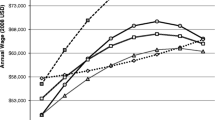Abstract
I examine the exit decision of registered nurses using the longitudinal data files generated by the March Current Population Surveys (CPS) from 1983 through 1994. By examining the wages of workers outside of nursing, a measure of the reservation wage is constructed and related to the decision to leave nursing, either for an alternative job or to exit employment. My results indicate that nurses respond to outside wage opportunities. A one standard deviation decrease in the difference between the actual and predicted log wage results in an 8 percent increase in the exit of nurses. Secretaries, however, are shown to have a much greater sensitivity to outside wages due to the lower degree of occupation-specific training required for secretarial jobs. A similar increase in the wage gap for secretaries results in an 18 percent increase in turnover. RNs employed in hospitals, covered by a union contract, and employed in the public sector are relatively attached to the nursing profession.
Similar content being viewed by others
References
Brider, Patricia. “Huge Job-Projections Shock Health Professionals.” American Journal of Nursing 96 (January 1996a): 61, 64.
—. “Enrollment Boom Ends as Job Hunts Lengthen.” American Journal of Nursing 96 (February 1996b): 61–62.
Cain, Glen G., Brian E. Becker, Catherine G. McLaughlin, and Albert E. Schwenk. “The Effect of Unions on Wages in Hospitals.” In Research in Labor Economics, edited by Ronald Ehrenberg. Vol. 4. Greenwich, Conn. JAI Press, 1981, pp. 191–320.
Freeman, Richard B. “The Exit Voice Tradeoff in the Labor Market: Unionism, Job Tenure, Quits, and Separations.” Quarterly Journal of Economics 94 (June 1980): 643–73.
Hirsch, Barry T., and Edward J. Schumacher. “Union Wages, Rents, and Skills, in Health Care Labor Markets.” Journal of Labor Research (forthcoming).
Link, Charles R. “Labor Supply Behavior of Registered Nurses: Female Labor Supply in the Future?” In Research in Labor Economics, edited by Ronald Ehrenberg. Vol. 13. Greenwich, Conn.: JAI Press, 1992, pp. 287–320.
—, and Russell F. Settle. “A Simultaneous-Equation Model of Labor Supply, Fertility and Earnings of Married Women: The Case of Registered Nurses.” Southern Economic Journal 47 (April 1981a): 977–89.
—. “Wage Incentives and Married Professional Nurses: A Case of Backward Bending Supply?” Economic Inquiry 19 (January 1981b): 144–56.
—. “Labor Supply Responses of Married Professional Nurses: New Evidence.” Journal of Human Resources 14 (Spring 1979): 256–66.
Murphy, Kevin M., and Robert H. Topel. “Estimation and Inference in Two-Step Econometric Models.” Journal of Business and Economic Statistics 3 (October 1985): 370–79.
Parker, Carl, and Bill Rickman. “Economic Determinants of the Labor Force Withdrawal of Registered Nurses.” Journal of Economics and Finance 19 (Spring 1995): 17–26.
Phillips, V.L. “Nurses' Labor Supply. Participation, Hours of Work and Discontinuities in the Supply Function.” Journal of Health Economics 14 (December 1995): 567–82.
Polivka, Anne E. and Jennifer M. Rothgeb. “Overhauling the Current Population Survey. Redesigning the Questionnaire.” Monthly Labor Review 116 (September 1993): 10–28.
Schumacher, Edward J. “Relative Wages and the Returns to Education in the Labor Market for Registered Nurses.” In Research in Labor Economics, Solomon Polachek, ed. Greenwich, Conn.: JAI Press, forthcoming.
—, and Barry T. Hirsch. “Compensating Differentials and Unmeasured Ability: Why Do Hospitals Pay More?” Industrial and Labor Relations Review 50 (July 1997): 557–79.
Author information
Authors and Affiliations
Additional information
The author appreciates the helpful comments of Barry Hirsch, David Macpherson, and Leola Ross.
Rights and permissions
About this article
Cite this article
Schumacher, E.J. Relative wages and exit behavior among registered nurses. J Labor Res 18, 581–592 (1997). https://doi.org/10.1007/s12122-997-1024-5
Issue Date:
DOI: https://doi.org/10.1007/s12122-997-1024-5




